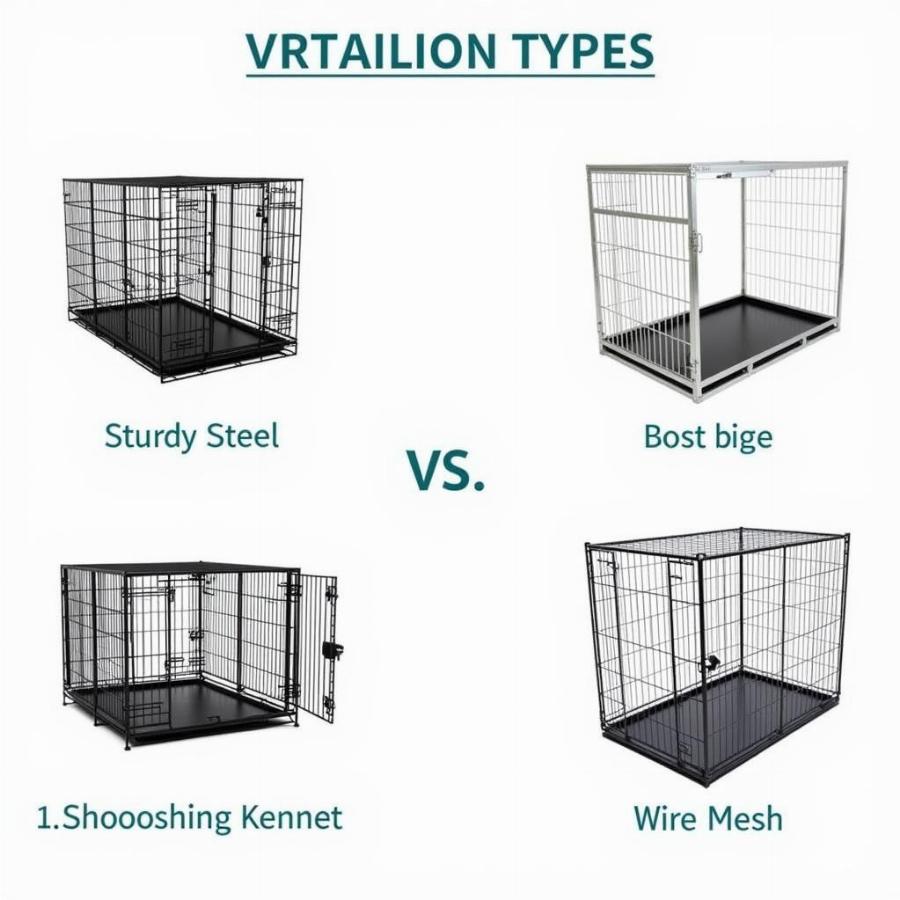Choosing the right cage for your dog is a crucial decision, and the material it’s made of plays a vital role in your pet’s safety, comfort, and overall well-being. When considering “metal for dog cage,” you’re likely looking for durability, security, and ease of cleaning. This article will delve into the specifics of metal dog cages, helping you make an informed choice that benefits both you and your beloved companion.
A metal dog cage offers several advantages over other materials like plastic or wood. Durability is a key factor, as metal cages can withstand wear and tear, especially from energetic dogs. They’re also easier to clean and sanitize, which is essential for maintaining a hygienic environment. Security is another important consideration, and a well-built metal cage can provide a safe and secure space for your dog. But not all metals are created equal, and understanding the different types and their pros and cons is essential for making the right decision.
Different Types of Metal Used in Dog Cages
Several types of metal are commonly used in dog cages, each with its own set of characteristics. Let’s explore the most popular options:
Steel: The Gold Standard
Steel is a popular choice for dog cages due to its strength and durability. It’s resistant to rust and corrosion, making it ideal for both indoor and outdoor use. Steel cages are also relatively easy to clean and maintain.
What are the benefits of steel for dog cages? Steel offers unparalleled strength, resisting bending and damage from even the most enthusiastic chewers.
Aluminum: Lightweight and Rust-Resistant
Aluminum is a lighter alternative to steel, making it easier to move and transport. It’s also naturally rust-resistant, which is a significant advantage. However, aluminum is not as strong as steel and may be more prone to bending.
Is aluminum a good choice for a dog cage? While lighter and rust-resistant, aluminum might not be the best option for strong chewers due to its malleability.
 Choosing the Right Metal for Your Dog Cage
Choosing the Right Metal for Your Dog Cage
Factors to Consider When Choosing a Metal Dog Cage
When selecting a metal dog cage, consider the following factors:
Size and Breed of Your Dog
The size of your dog will determine the dimensions of the cage you need. A larger breed will require a more spacious cage than a smaller breed. Ensure the cage allows your dog to stand, turn around, and lie down comfortably.
Indoor or Outdoor Use
If you plan to use the cage outdoors, choose a metal that can withstand the elements. Steel, with its rust-resistant properties, is a good option for outdoor use.
Chew-Proofing
If your dog is a chewer, look for a cage with reinforced corners and heavy-duty construction. Consider a steel cage, as it’s more resistant to chewing than aluminum.
Maintaining Your Metal Dog Cage
Proper maintenance can extend the lifespan of your metal dog cage. Regular cleaning is essential to prevent the buildup of dirt, bacteria, and odors. Use a pet-safe cleaner and disinfect the cage regularly.
How do I clean a metal dog cage? Regular cleaning with a pet-safe disinfectant and a thorough rinse will keep your dog’s cage clean and hygienic.
Rust Prevention
While some metals are naturally rust-resistant, it’s still important to take preventative measures. Avoid placing the cage in damp areas and dry it thoroughly after cleaning. You can also apply a rust-proof coating to further protect the metal.
Metal Cage Dog Kennel: A Secure and Comfortable Home
A metal cage dog kennel offers a secure and comfortable space for your dog. It can serve as a den-like retreat, a safe place for training, or a convenient way to transport your pet. Choose a kennel that is appropriately sized for your dog and offers adequate ventilation.
A large metal dog cage provides ample space for larger breeds to move around comfortably. It can be used indoors or outdoors, providing a versatile and durable housing solution.
For those with giant breeds, a big metal dog cage is a necessity. Ensure the cage is robust enough to withstand the strength and size of your dog.
Conclusion
Choosing the right metal for your dog’s cage is a crucial decision that impacts your pet’s well-being. Consider factors like durability, size, and chew-proofing when making your choice. With proper care and maintenance, a metal dog cage can provide a safe, secure, and comfortable environment for your furry friend for years to come.
FAQs
- What is the best metal for a dog cage? Steel is generally considered the best due to its strength and durability.
- Are aluminum dog cages safe? Yes, aluminum cages are safe, but they may not be suitable for heavy chewers.
- How do I prevent rust on a metal dog cage? Keep the cage dry, clean it regularly, and consider a rust-proof coating.
- What size dog cage do I need? The size depends on your dog’s breed and size. Ensure they can stand, turn, and lie down comfortably.
- Can I use a metal dog cage outdoors? Yes, especially steel cages, which are resistant to the elements.
- Are wire crates good for dogs? Wire crates offer good ventilation and visibility but may not be suitable for dogs who are prone to escaping or chewing.
- How often should I clean my dog’s metal cage? Regular cleaning, at least weekly, is recommended.
Beaut Dogs is your trusted source for all things related to dog care. We provide expert advice and valuable resources to help you navigate the world of dog ownership. For personalized assistance, please contact us at [email protected]. Beaut Dogs is committed to providing the best information for your beloved canine companions. Visit us at https://beautdogs.com.